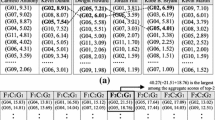Abstract
Our starting motivation is a user visiting an e-shop. E-shops usually offer conjunction of sharp filter conditions and one attribute ordering of results. We use a top-k query system where results are ordered by a multi-criterial monotone combination of soft filter conditions.
For prediction of users’ behavior, we introduce a class of basis functions with positive Linear combination of Triangular (soft) filters (LT). We prove that LT gives a unique representation of preferences. From database point of view LT act as a source for choosing pivots. From business perspective LT reflect aggregation of users’ (soft) ideal values (choice points).
Our experiments use artificial data and are organized along variants of user’s search habits, learning algorithms and evaluation measures. We argue that LT recommendations behave better with respect to order sensitive measures. This gives raise a problem of pivot based indexing with order sensitive metrics.
Access this chapter
Tax calculation will be finalised at checkout
Purchases are for personal use only
Similar content being viewed by others
References
Eckhardt, A.: Similarity of users’ (content-based) preference models for Collaborative filtering in few ratings scenario. Expert Syst. Appl. 39(14), 11511–11516 (2012)
Fagin, R., Lotem, A., Naor, M.: Optimal aggregation algorithms for middleware. JCSS 66(4), 614–656 (2003). (Preliminary version ACM PODS 2001)
Peska, L., Vojtas, P.: Using implicit preference relations to improve recommender systems. J. Data Semant., 1–16 (2016). http://dx.doi.org/10.1007/s13740-016-0061-8
Vojtas, P.: Linear combinations of triangular attribute preferences provide unique representation of user preferences. Seminar of Prof. E. Huellermeier, Marburg, 26 February 2013
Vojtas, P., Kopecky, M., Vomlelova, M.: Understanding transparent and complicated users as instances of preference learning for recommender systems. In: Kofron, J., Vojnar, T. (eds.) MEMICS 2015. LNCS, vol. 9548, pp. 23–34. Springer, Heidelberg (2016). doi:10.1007/978-3-319-29817-7_3
Acknowledgements
We announce partial support of Czech grants P103-15-19877S, 16-09103S and P46.
Author information
Authors and Affiliations
Corresponding author
Editor information
Editors and Affiliations
Rights and permissions
Copyright information
© 2016 Springer International Publishing Switzerland
About this paper
Cite this paper
Kopecky, M., Vomlelova, M., Vojtas, P. (2016). Basis Functions as Pivots in Space of Users Preferences. In: Ivanović, M., et al. New Trends in Databases and Information Systems. ADBIS 2016. Communications in Computer and Information Science, vol 637. Springer, Cham. https://doi.org/10.1007/978-3-319-44066-8_5
Download citation
DOI: https://doi.org/10.1007/978-3-319-44066-8_5
Published:
Publisher Name: Springer, Cham
Print ISBN: 978-3-319-44065-1
Online ISBN: 978-3-319-44066-8
eBook Packages: Computer ScienceComputer Science (R0)




